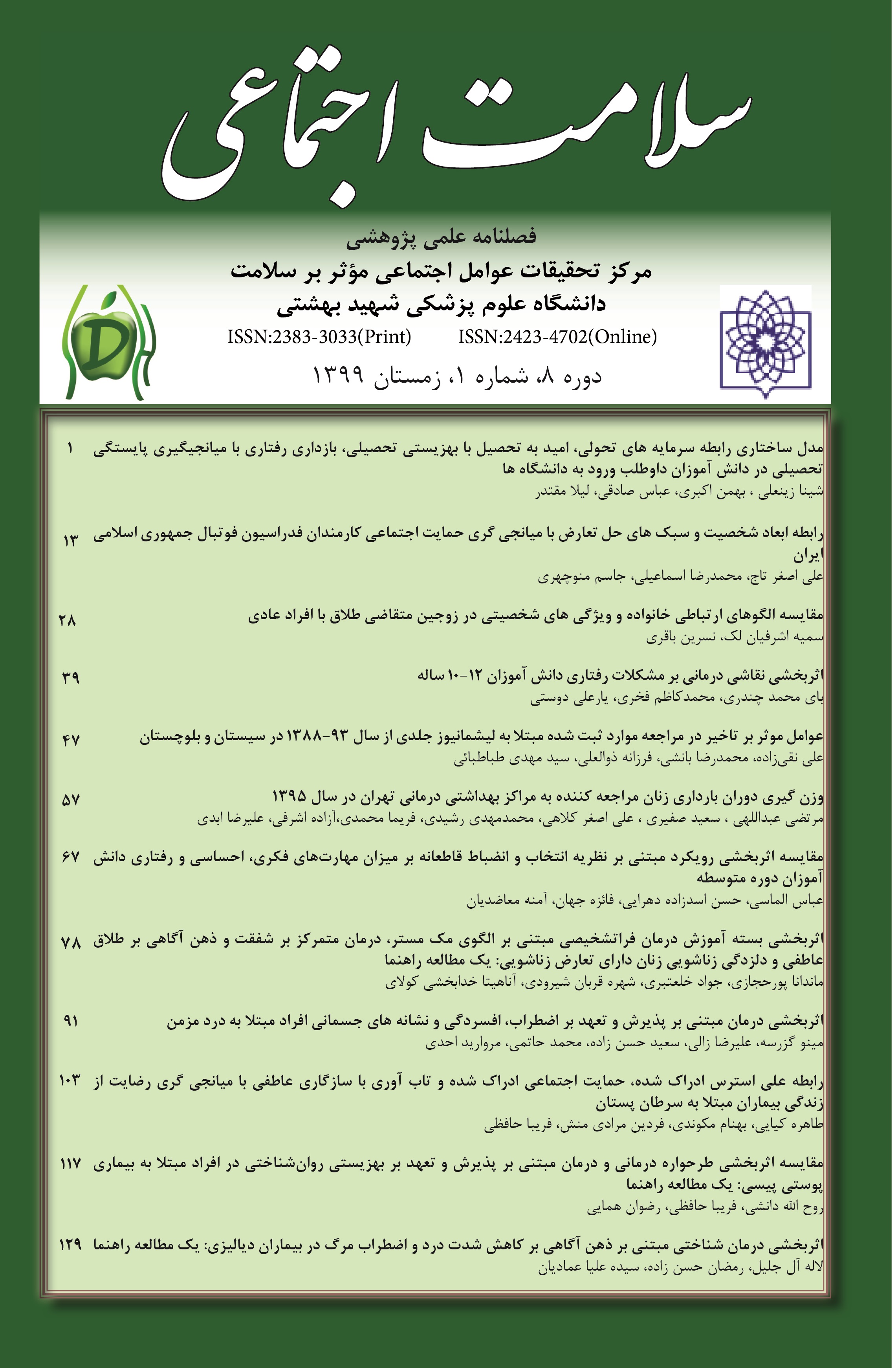پیش بینی خودتنظیمی تحصیلی براساس مؤلفه های سبک های اسنادی دانش آموزان دوم متوسطه ناحیه یک شهر ساری
سلامت اجتماعی,
دوره 7 شماره 2,
22 خرداد 2020
,
صفحه 175-182
https://doi.org/10.22037/ch.v7i2.25256
چکیده
زمینه و هدف: یکی از عوامل انگیزشی شناختی که بر ابعاد مختلف زندگی انسان از جمله یادگیری و پیشرفت تحصیلی تأثیر دارد، سبک های اسنادی است. هدف پژوهش حاضر، پیش بینی خود تنظیمی تحصیلی بر اساس مؤلفه های سبک های اسنادی دانش آموزان بود.
روش و مواد: روش پژوهش توصیفی همبستگی و جامعه آماري شامل كليه دانش آموزان دوره دوم متوسطه شهر ساری در سال تحصیلی 96 – 1395 بود که از این تعداد 375 دانش آموز با روش نمونه گیری خوشه ای و طبقه ای وارد مطالعه شدند. از این تعداد 160 نفر پسر و 215 نفر دختر بودند. ابزار جمع آوری داده ها، پرسشنامه خودتنظیمی تحصیلی و پرسشنامه سبک های اسنادی بود. براي تجزیه و تحليل داده های پژوهش از روش هاي آماري ضریب همبستگي پيرسون و تحليل رگرسیون چند متغیره با کمک نرم افزار SPSS-22 استفاده شد.
یافته ها: میانگین (انحراف معیار) سن پسران (4/3) 4/16 و دختران (7/3) 8/16 سال بود. با افزایش میانگین (انحراف معیار) نمره کل سبک های اسنادی (2/15) 9/147 و مؤلفه های آن شامل منبع کنترل (7/6) 7/49، میزان ثبات (6) 2/49 و جامعیت (3/6) 9/48، میزان خودتنظیمی تحصیلی (9/7) 5/45 دانش آموزان افزایش یافت (01/0>P). همچنین مؤلفه منبع کنترل متغیر ملاک خودتنظیمی را پیش بینی می کرد (001/0>P) ولی متغیر میزان ثبات و جامعیت توان پیش بینی خودتنظیمی را نداشتند.
نتیجه گیری: مطالعه نشان داد که با افزایش مؤلفه های سبک های اسنادی، خود تنظیمی تحصیلی دانش آموزان افزایش یافت. همچنین از بین مؤلفه های متغیر سبک های اسنادی، مؤلفه منبع کنترل، خودتنظیمی تحصیلی در دانش آموزان را پیش بینی می کند.
- خود تنظیمی تحصیلی، سبک های اسناد، دانش آموزان
ارجاع به مقاله
مراجع
Abolghasemi A, Barzegar S & Rostamoghli Z. The effectiveness of self-regulation learning training on academic motivation and self-efficacy of students with mathematics disorder. Journal of Learning Disabilities, 2013; 4(2): 6-21. (Full Text in Persian).
Wolters CA, Hussain M. Investigating grit and its relations with college students’ self-regulated learning and academic achievement. Metacognition and Learning. 2015;10(3):293-311.
Berger JL, Karabenick SA. Motivation and students’ use of learning strategies: Evidence of unidirectional effects in mathematics classrooms. Learning and instruction. 2011;21(3):416-28.
Kolovelonis A, Goudas M, Dermitzaki I. The effect of different goals and self-recording on self-regulation of learning a motor skill in a physical education setting. Learning and Instruction. 2011;21(3):355-64.
Järvelä S, Järvenoja H. Socially constructed self-regulated learning and motivation regulation in collaborative learning groups. Teachers College Record. 2011;113(2):350-74.
Chodkiewicz AR, Boyle C. Exploring the contribution of attribution retraining to student perceptions and the learning process. Educational Psychology in Practice. 2014;30(1):78-87.
Sogh MT, Karimi A, Haghighi H, Aryamanesh S, Danshjoo MJ, Ghaderi F. Examining the relationship between attribution style and personality characteristics and academic performance of Bandar Abbas high school students. J Life Sci Biomed. 2013;3(3):203-8.
Tirri K, Nokelainen P. The influence of self-perception of abilities and attribution styles on academic choices: Implications for gifted education. Roeper Review. 2010;33(1):26-32.
Cheng PY, Chiou WB. Achievement, attributions, self-efficacy, and goal setting by accounting undergraduates. Psychological reports. 2010;106(1):54-64.
Luginbuhl JE, Crowe DH, Kahan JP. Causal attributions for success and failure. Journal of Personality and Social Psychology. 1975;31(1):86.
Mark G, Smith AP. Effects of occupational stress, job characteristics, coping, and attributional style on the mental health and job satisfaction of university employees. Anxiety, Stress & Coping. 2012;25(1):63-78.
Perry RP, Stupnisky RH, Hall NC, Chipperfield JG, Weiner B. Bad starts and better finishes: Attributional retraining and initial performance in competitive achievement settings. Journal of Social and Clinical Psychology. 2010;29(6):668-700.
Yazdanpanah A, Ghasemi A, Siamian H, Javadian M. The Study of the Attributional Style of the Students Studying in Mazandaran University of Medical Sciences in 2008-2009. J Mazandaran Univ Med Sci. 2011; 21 (82) :84-88. (Full Text in Persian).
Bakracevic Vukman K, Licardo M. How cognitive, metacognitive, motivational and emotional self‐regulation influence school performance in adolescence and early adulthood. Educational Studies. 2010;36(3):259-68.
Motie H, Heidari M, Sadeghi MA. Predicting academic procrastination during self-regulated learning in Iranian first grade high school students. Procedia-Social and Behavioral Sciences. 2012;69:2299-308.
Rodríguez-Naranjo C, Caño A. Development and validation of an attributional style questionnaire for adolescents. Psychological Assessment. 2010;22(4):837.
Shaghaghy F, Saffarinia M, Iranpoor M, Soltanynejad A. The relationship of early maladaptive schemas, attributional styles and learned helplessness among addicted and non-addicted men. Addiction & health. 2011;3(1-2):45.
Azevedo R, Behnagh R, Duffy M, Harley J, Trevors G. Metacognition and self-regulated learning in student-centered leaning environments. Theoretical foundations of student-centered learning environments. 2012 22:171-97.
Gargari RB, Sabouri H, Norzad F. Academic procrastination: The relationship between causal attribution styles and behavioral postponement. Iranian journal of psychiatry and behavioral sciences. 2011;5(2):76.
Ahanchiyan M, Arfaa F, Bahmanabadi S. The Association Between Attribution Style and Self-Regulation among Students of School of Nursing and Midwifery in Mashhad University of Medical Sciences During 2011-12 Academic Years. Iranian Journal of Medical Education. 2014; 14 (4) :350-362.
Marsh R, Steinglass JE, Gerber AJ, O’Leary KG, Wang Z, Murphy D, Walsh BT, Peterson BS. Deficient activity in the neural systems that mediate self-regulatory control in bulimia nervosa. Archives of general psychiatry. 2009;66(1):51-63.
Claes L, Vertommen S, Smits D, Bijttebier P. Emotional reactivity and self-regulation in relation to personality disorders. Personality and Individual Differences. 2009;47(8):948-53.
Bornovalova MA, Fishman S, Strong DR, Kruglanski AW, Lejuez CW. Borderline personality disorder in the context of self-regulation: Understanding symptoms and hallmark features as deficits in locomotion and assessment. Personality and Individual Differences. 2008;44(1):22-31.
Ning HK, Downing K. The reciprocal relationship between motivation and self-regulation: A longitudinal study on academic performance. Learning and Individual Differences. 2010;20(6):682-6.
- چکیده مشاهده شده: 233 بار
- PDF دانلود شده: 109 بار
